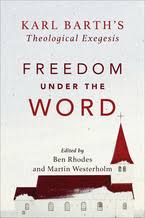 This new book caught my eye: Freedom under the Word: Karl Barth’s Theological Exegesis (Baker, 2019).
This new book caught my eye: Freedom under the Word: Karl Barth’s Theological Exegesis (Baker, 2019).
Let me just admit that the first reason is personal: It’s got essays by three of my theology friends who are alum of the Torrey Honors Institute. Ben Rhodes (co-editor) wrote the chapter on “Barth’s Theology of Scripture in Dogmatic Perspective;” Carsten Card-Hyatt wrote the chapter entitled “The Call to Repentance is the Call of the Gospel: Barth, the Epistle of James, and Moral Theology;” and Christina Larsen wrote “Barth on God’s Graciousness toward Humanity in Genesis.” That’s a trifecta of Torrey grads doing theology in one volume.¹
My pride is a little more than just “yay for our team,” though. It’s also connected to the fact that if we teach anything in Torrey, we teach undergrads how to read great books well, and especially to read great books that open up the greatest book, the Bible. So it’s gratifying to see our alum go on to much higher levels of academic accomplishment, very much their own thinkers with their own projects, but still recognizably committed to the task of figuring out what deserves the closest reading, and what leads further into deep engagement with Scripture.
All fifteen chapters (plus a substantive intro) are on task. Some are just obviously self-recommending: Francis Watson on Romans; John Webster on Ephesians; Mark Gignilliat on Isaiah; Grant Macaskill on Romans 5, and so on.
And the thing itself, of course, is the enormously fascinating phenomenon of Karl Barth’s reading of Scripture. It is astonishing how much attention he gave as a systematic theologian to the Bible, both in the courses he taught (especially in his most formative years) and in his published work from Romans to the Church Dogmatics. As Ben Rhodes and Martin Westerholm say in the introduction,
Study of Barth’s work in recent decades was dominated for a time by heavily conceptualized debates that turned not on attention to the particularities and surprises of Barth’s exegesis but on the capacity of particular master concepts to facilitate a systematizing of the whole of Barth’s thought. Among the casualties of these debates was patient attention to the way that the twists and turns of Barth’s theology are themselves reflections of his attempt to listen to the complex voice of Scripture. (1)
This volume goes some way toward making up for that: at 300 pages of carefully argued, well-observed work, Freedom under the Word shifts the focus of attention to what Barth once (in 1935) picked out as the three most important elements of theological work: “exegesis, exegesis, and yet more exegesis.”
______________________
¹The standing record for largest number of Torrey-affiliated theologians in a single volume is still held by Adam Johnson’s T & T Clark Companion to the Atonement, which also has three alum plus some faculty.